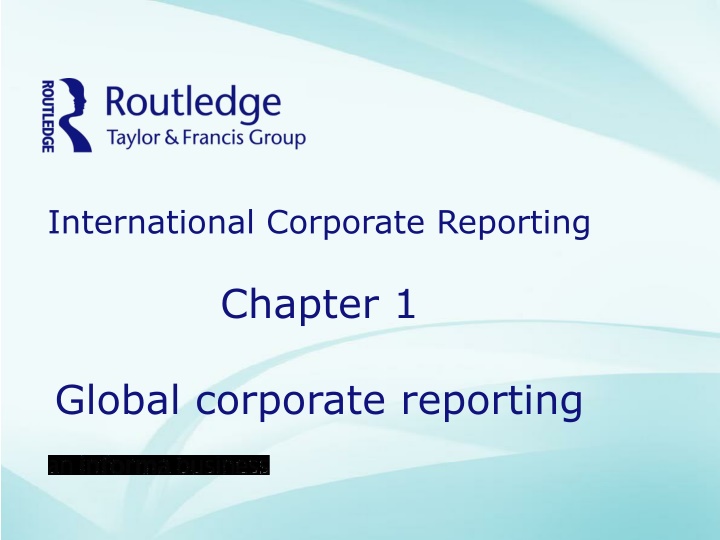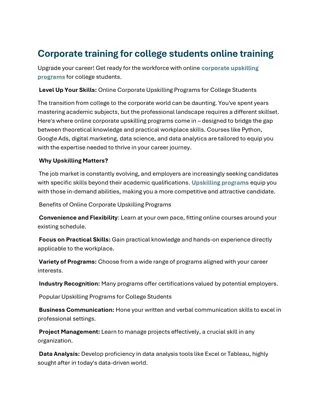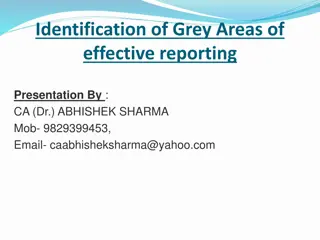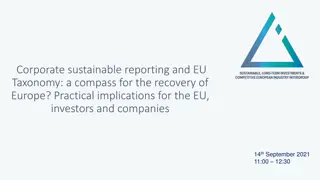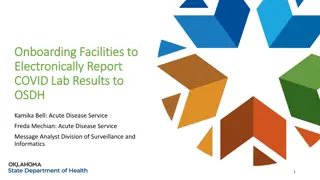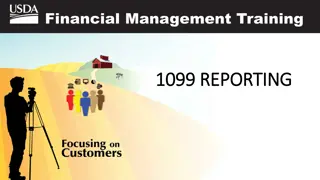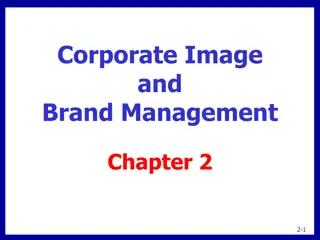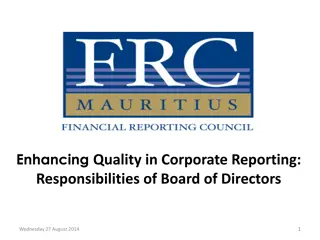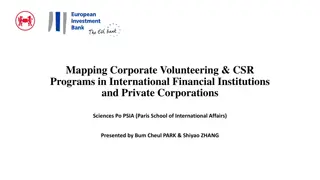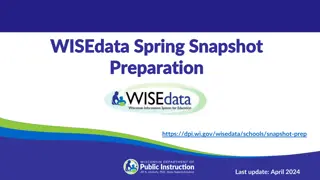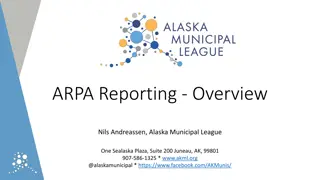Components of International Corporate Reporting
International corporate reporting encompasses various components such as accounting, assurance, auditing, corporate governance, regulations, standards, and financial reporting. These components play a crucial role in providing transparency and accountability to stakeholders globally.
Download Presentation

Please find below an Image/Link to download the presentation.
The content on the website is provided AS IS for your information and personal use only. It may not be sold, licensed, or shared on other websites without obtaining consent from the author.If you encounter any issues during the download, it is possible that the publisher has removed the file from their server.
You are allowed to download the files provided on this website for personal or commercial use, subject to the condition that they are used lawfully. All files are the property of their respective owners.
The content on the website is provided AS IS for your information and personal use only. It may not be sold, licensed, or shared on other websites without obtaining consent from the author.
E N D
Presentation Transcript
International Corporate Reporting Chapter 1 Global corporate reporting
Components of corporate reporting Corporate reporting Accounting Assurance Accounting system Auditing Corporate governance Accounting regulations, standards and guidance Accounting practice Financial statements and financial reporting plus Non-finnacial reporting
Accounting system and standards An accounting system is the collection of regulations, guidance and practice that are identifiable for a particular country or jurisdiction, or for a group of countries or jurisdictions. The work of the IASB provides accounting standards and related guidance that are accepted in many countries.
Accounting regulations Set within national law or the law of a wider jurisdiction such as the EU. The regulations may be accompanied by official guidance. IFRS Standards, as a set of accounting standards, may be applied through the legal process of a country or wider jurisdiction that adopts them. de jure means accounting regulation set out within a legal or regulatory process.
Financial reporting Financial reporting covers the reports prepared by managers of an entity in reporting their stewardship of financial resources to those who have entrusted resources to their care. The abbreviation GAAP is frequently used as shorthand for generally accepted accounting principles but may have different meanings in different countries.
Primary financial statements (IAS 1) (a) a statement of financial position (balance sheet) (b) an income statement (profit and loss statement) (c) a statement of other comprehensive income [(b) and (c) may be combined in a single statement of comprehensive income] (d) a statement of changes in equity (e) a statement of cash flows
Accounting practice Observed in the financial statements and non- financial reports. De facto means observed practice. Where regulation prescribes options for practice, there may be a dominant preference in a jurisdiction for one practice over another. The presence of a dominant practice may affect comparability across jurisdictions.
Non-financial reporting Recognition that when resources are provided to an entity, the activity and accountability of management extend well beyond financial matters. In particular, corporate social responsibility is seen as an essential aspect of the accountability of an entity in contributing to long-term sustainability of the planet.
Key milestones to current state 1973 International Accounting Standards Committee (IASC) produce IAS Standards. Aim to encourage improvement internationally, through professional bodies as IASC members. 2000 International Organization of Securities Commissions endorsed IAS Standards for use in member stock exchanges, subject to some conditions. Opened door to acceptance of global accounting standards.
Current trends in global reporting 2000 International Accounting Standards Board (IASB) began issuing IFRS Standards (including IAS Standards). 2000-05 IASB revised standards to meet IOSCO requirements. 2002 EU announced mandatory application of EU- endorsed IFRS from 2005 for listed group companies. 2005 EU-endorsed IFRS in EU capital markets
Current trends IFRS and US GAAP 2005 onwards, language of convergence , joint projects IASB and FASB 2007 SEC announced that foreign companies could use full IFRS in financial statements for US stock markets. 2010 cooling of relationship with US GAAP.
Top 100 global companies (market capitalisation) United States EU (with UK) China (with Hong Kong) Asia pacific ex Japan and China Europe non EU North America ex USA Middle East and Africa Japan Total Number 54 18 14 5 3 2 2 2 100 55 use US GAAP, 28 use IFRS, 17 use national standards close to IFRS
Top 500 global companies (By revenue) United States EU (with UK) China (with Hong Kong) Japan Asia pacific ex Japan and China Europe non EU North America ex USA South America Middle East and Africa Number % 126 122 111 52 25.2% 24.4% 22.2% 10.4% 44 20 16 7 2 500 8.8% 4.0% 3.2% 1.4% 0.4% Total 100.00% US companies become less significant %
Assurance Auditing and Corporate governance
International Standards on Auditing Initiatives on auditing emerged from the work of the accountancy professional bodies, through the International Federation of Accountants (IFAC) and establishment of the independent International Auditing and Assurance Board (IAASB). International Standards on Auditing (ISAs) are gaining global acceptance through incorporation into national audit regulations.
Corporate governance codes Early initiatives in corporate governance codes may be attributed to particular countries, based on greater assurance in stock markets. The work of the Organisation for Economic Co- operation and Development (OECD) has given governmental support to principles of corporate governance, either thorough voluntary codes or through national law.
Non-financial reporting Corporate Social Responsibility (CSR)
CSR reporting Global Reporting Initiative (GRI) established 1997 in USA. Now has worldwide partnerships and is used as a structure for annual reports in many countries. Other global initiatives have emerged (chapters 8, 12 and 13). ESG (environmental, social and governance) reporting is of interest to investors.
Challenging globalisation The initiatives that lead to developments in global corporate reporting will typically seek to develop a set of standards that will gain widespread acceptance and might eventually led to adoption within the law of countries or jurisdictions. Reduces diversity, so reduces flexibility. Needs agreement from national governments and regulators. May be a compromise of theoretical quality with with political acceptability to companies, governments, accountants and users.
Challenging globalisation Local differences or characteristics may be ignored. Powerful preparers may influence on the political system. A country or company with unique needs or characteristics may not be able to adopt a different method of corporate reporting more suited to its own circumstances.
The language we use We write in English, and we use translations about institutions and cultures that have developed in other languages. Researchers publish papers in English about evidence that was collected in other languages. Language translation is socio-cultural, subjective and ideological. Challenges to teachers, researchers, students, to be aware of limitations where translation is used.
